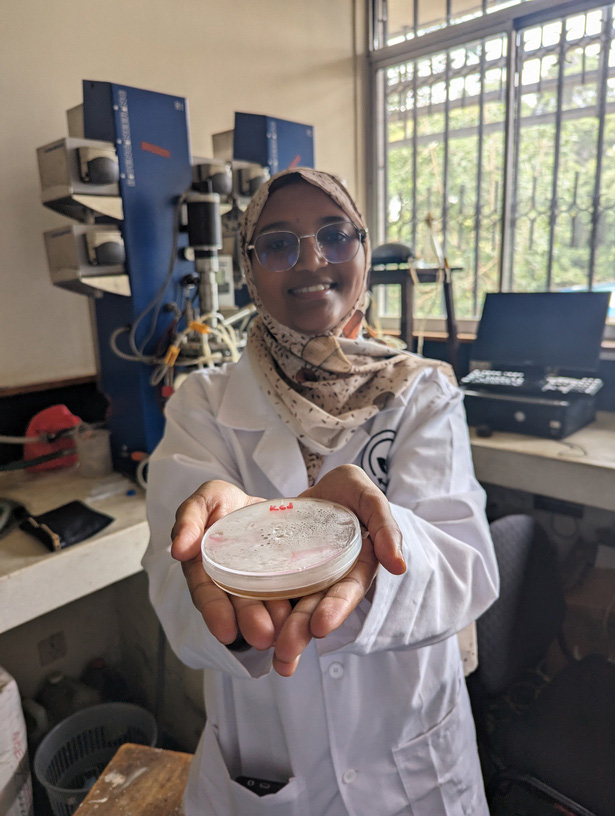May 13, 2025
Five finalist teams unveil bold ideas for transforming waste into value in culmination of Ferris State’s international Wege Prize design competition

Take. Make. Dispose. That’s long been the extractive, linear mindset powering the world’s economies. But what if our prosperity wasn’t tied to the relentless consumption of finite resources?
It's a powerful question that lies at the heart of Wege Prize, an international student design competition organized by Ferris State University’s Kendall College of Art and Design that has been inspiring college and university students from across the globe to rethink the way we produce and consume since 2013.

Rethread Africa has team members studying in Kenya to convert converting sugarcane bagasse into a biodegradable alternative to traditional plastic synthetics that decomposes in natural environments.
Each year, Wege Prize teams compete for a share of $65,000 in prize money through an immersive nine-month process in which they evolve an initial research plan into a product, service, system, or other solution to a problem of their choosing that aligns with the principles of the circular economy, a model that redefines economic growth by focusing on positive society-wide benefits.
They’re mentored along the way by a diverse judging panel of industry professionals who channel their expertise into helping ideas change and grow for the better.
Participating teams are also required to represent different majors and academic institutions, embracing the reality that complex systemic challenges like food insecurity, environmental degradation, and climate change cannot be solved by a single field of knowledge working in isolation.
“Collaborations are the core of meaningful solutions to redesigning how economies work,” says Gayle DeBruyn, an award-winning Ferris State University KCAD professor and leader of Wege Prize. “Wege Prize’s student teams understand that working together across institutional, disciplinary, and cultural boundaries creates a promising path to achieving their fully realized, game-changing designs.”
Now in its 12th year, Wege Prize has announced the 5 finalist teams in the 2025 competition, who will present their highly developed solutions to the judging panel and public live and streaming audiences during the 2025 Wege Prize Awards event in Grand Rapids, 10 a.m. on Friday, May 16th at KCAD and streaming live online at wegeprize.org.
- Agpress, with team members studying in the United States, Costa Rica, and Tanzania, is integrating mealworm farming with maize flour production to create protein-enriched flour to abate malnutrition, including repurposing agricultural waste into compost.
- Dry Fresh Solution, with team members studying in Rwanda, is developing a solar-powered dehydrator that extends the shelf life of fruit and vegetables by removing moisture through indirect heating, reducing post-harvest losses.
- Eco Nasi, with team members studying in Kenya, is developing a novel technology that converts pineapple pulp waste into a premium high performance leather alternative that is five times more durable than conventional leather.
- Envirovex, with team members studying in England, Spain, and the United States is implementing bio-based wastewater treatment technologies to take on sources of antibiotic release from agriculture, livestock, pharmaceutical, and wastewater discharge.
- Rethread Africa, with team members studying in Kenya, is converting sugarcane bagasse into a biodegradable alternative to traditional plastic synthetics that decomposes in natural environments.
Conservation student Marie Merci Cyurimpundu of Dry Fresh Solution says the team wants people to start thinking about what they can do with waste and how the raw material can be used for something else.
“Collaboration is not about just dividing tasks—it’s about having different perspectives on something and working together to form a strong, big idea,” she says, adding the aim is to provide solutions that are not only scientifically sound but also things farmers can really implement. “What I learned is that sustainability is not about sciences. It’s about the design—can it be implemented? Is it what the community needs?”
Phased input from Wege Prize judges has helped advance the five finalist teams’ from informal proposals into robust and feasible solutions through focused testing, research, market analysis, and real-world prototyping.
“Through all this, we have refined our solution, and now we can clearly see where we’re going forward. We have the opportunity to implement it as a real solution with societal impact,” said Envirovex team member Vishwa Maharajan.
To date, Wege Prize has engaged over 1,700 participants from 68 countries around the world. Past winners have launched an equitable eco-tourism platform for indigenous communities in Mexico, turned one of the planet’s most formidable invasive species into a biodegradable alternative to petroleum-based plastic, and cracked the code on vegan leather with a versatile biodegradable material made from banana crop waste, among many other innovations.
To attend the 2025 Wege Prize Awards or to view the livestream and see the students present their original ideas and respond to final judge feedback, click on the event details and registration at www.wegeprize.org.

